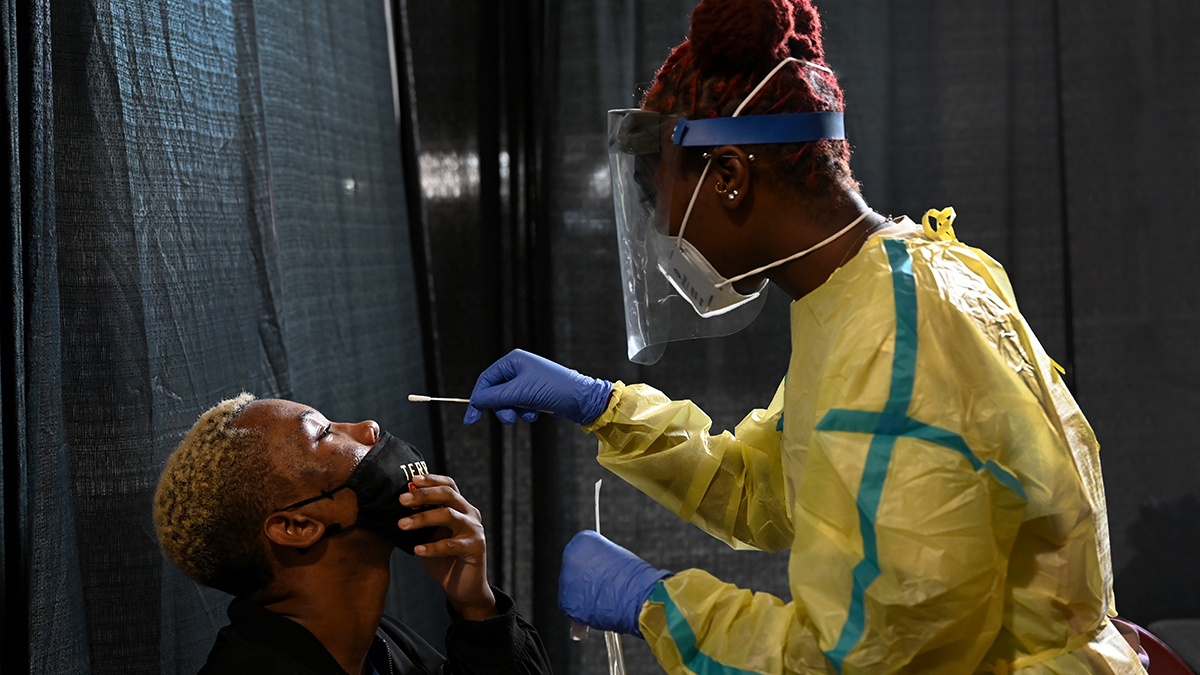D.C. is suspending indoor dining starting Wednesday at 10 p.m., officials announced last week. The order, which also shuts down museums and libraries, will remain in effect until Jan. 15.
Mayor Muriel Bowser also announced that the state of emergency and public health emergency for D.C. would be extended through March 31, 2021.
The District is following Prince George's and Montgomery counties, which already suspended indoor dining as coronavirus cases surge.
Thirty-three Montgomery County restaurant owners are seeking a temporary restraining order to block the indoor dining ban that started Dec. 15.
They argue outdoor and carryout dining only brings in about 25% of the revenue they need and that the ban could force 45% of the county’s restaurants to close. That’s more than 800 restaurants.
The restaurants’ attorney says the indoor dining ban causes “irreparable harm – a certain death knell to the restaurant industry.”
Montgomery County lawyers argue the ban was legally enacted by County Executive Marc Elrich and approved by the council. They say that a temporary restraining order “would undermine steps to protect residents of Montgomery County” and would put “countless people at risk of infection and death.”
The hearing is being conducted Wednesday by phone.
Northern Virginia only has about 500 open beds because across the Commonwealth there are now more COVID-19 patients in the hospital than at any other time during the pandemic.
As of Tuesday, 2,166 patients confirmed positive for COVID-19 were hospitalized in Virginia, according to the Virginia Hospital and Healthcare Association.
"I am concerned, like everyone else in the country, with the next set of holidays coming in, if we're going to continue to be able to match that demand," said Dr. Narang.
In Montgomery County, more than three quarters of all ICU beds are full, officials say. Montgomery County Executive Marc Erich is warning people not to gather in groups for the holidays as infections spread with a “very high risk of transmission.”
“Vaccines for the general population are still probably months away. They’re not coming tomorrow, they won’t be here in January,” Elrich said, urging people not to let their guards down.
The Trump administration has announced a deal with Pfizer and BioNTech to purchase 100 million doses of the COVID-19 vaccine in the second quarter of next year.
The first round of Moderna COVID-19 vaccine doses for Montgomery County arrived Wednesday morning, the Montgomery County Health Department announced. This initial shipment will be reserved for county health staff on the front lines of the pandemic.
This week, a total of 36,075 doses of the Pfizer vaccine and 104,300 doses of the Moderna vaccine are set to arrive in Maryland, bringing the state's total allocation to 191,075 doses, which is enough to vaccinate 90% of front line hospital workers, according to a Monday update from the office of Gov. Larry Hogan.
We're making it easier for you to find stories that matter with our new newsletter — The 4Front. Sign up here and get news that is important for you to your inbox.
The District is set to receive 12,600 doses of the Moderna vaccine from the federal government this week and 8,000 from Maryland this week, D.C. Mayor Muriel Bowser announced Monday.
The second and third shipments of the Pfizer vaccine are also expected to arrive this week – 8,775 doses from Virginia and 4,875 from the federal government.
The number of Americans seeking unemployment benefits fell by 89,000 last week to a still-elevated 803,000, according to new data released Wednesday by the Labor Department.
The report indicates that the job market remains under stress nine months after the coronavirus outbreak sent the U.S. economy into recession and caused millions of layoffs.
In Virginia, COVID-19 wiped out nearly a decade of job gains in just two months, according to Old Dominion's new State of the Commonwealth report.
Food insecurity is also projected to continue rising. The number of individuals receiving SNAP benefits in Virginia jumped from more than 687,000 in March to more than 785,000 in July.
The report also says nearly half of the people across the country going to food banks this year were first-time visitors.
What the Data Shows
D.C., Maryland and Virginia recorded an additional 6,130 cases of the virus Wednesday. Eighty-six more people with COVID-19 died in our region.
The seven-day average of new cases stayed level in D.C. and Maryland on Wednesday but rose for the fourth consecutive day in Virginia to 2,845.
D.C. reported a staggering 326 new infections and seven more deaths. Maryland reported 2,465 more cases, and another 49 lives lost.
Virginia reported 3,339 confirmed cases, the second highest 24-hour increase yet, and 30 more deaths.
In D.C., there are 253 patients currently hospitalized with coronavirus. In Maryland the hospitalization count rose to 1,776 Wednesday.
Virginia set a new record high Wednesday with 2,232 patients hospitalized with confirmed cases of COVID-19.
Local Coronavirus Headlines
- The stress of the pandemic is a grind. A data analysis from the American Dental Association shows a surge in cases of teeth grinding, clenching and cracking during the COVID-19 crisis. The increases are striking and potentially costly and painful for sufferers.
- All Maryland hospitals are expected to receive some COVID-19 vaccines in the next two weeks to begin vaccinating critical frontline staff, a state health official said Tuesday.
- A professor is using the trust Black Americans have in barbers to make them more comfortable with taking the COVID-19 vaccine.
- Meet "The First Five," the group of D.C. emergency responders who will be the first members of the D.C. Fire and EMS Department to get the COVID-19 vaccine this coming week.
- A rapid antigen test might seem like a great idea when you're in a hurry and don't have time to wait a few days for results, but those tests are really designed for people with COVID-19 symptoms and in asymptomatic patients can deliver false positive results.
- News4 has obtained a list of two dozen Maryland hospitals expected to receive the first shipment of Pfizer vaccines once it receives emergency authorization from the Food and Drug Administration.
- Health officials in Virginia say they'll likely have to scale back on contact tracing because coronavirus transmission levels are rising so high.
- Help is available for thousands of D.C. residents who have fallen behind on rent payments.
- D.C. Public Schools is preparing for an ambitious pilot program in which it will regularly test some students and staff for the coronavirus.
- Maryland Gov. Larry Hogan announced measures to boost the number of available health care workers and plan for more hospital beds.
- COVID-19 numbers continue to paint a dire picture for Black Americans, and there is an ongoing effort in the Black community to increase testing.
Reopening Tracker
- D.C. is set to suspend indoor dining starting Dec. 23 at 10 p.m. and continuing until 5 a.m. on Jan. 15, Mayor Muriel Bowser said in a press release.
- Virginia instituted a curfew and a stricter mask mandate.
- Montgomery County's executive has proposed suspending indoor dining, tighter capacity limits at religious institutions and other new restrictions that would take effect 5 p.m. Tuesday, if approved by the county council.
- Maryland tightened restrictions on businesses, bars and restaurants.
- All Smithsonian museums and the National Zoo closed because of rising COVID-19 cases, officials announced.
- Hours before some Fairfax County students were set to return to in-person learning, the school district said that they needed to delay the plan.
- Courts throughout Maryland partially shut down due to the pandemic.
- Virginia announced new measures to fight COVID-19 as cases of the virus have spiked across the country.
- Prince George's County tightened restrictions and required masks to be worn outdoors.
- Montgomery County reduced capacity limits at many businesses, including for indoor dining, to 25%. The county previously stopped giving waivers for alcohol sales after 10 p.m.
- D.C.'s mayor extended the city's coronavirus state of emergency to last through the end of the year.
How to Stay Safe
Anyone can get COVID-19. Here are three simple ways the CDC says you can lower your risk:
- Wear a snug-fitting mask that covers your nose and mouth.
- Avoid being indoors with people who are not members of your household. The more people you are in contact with, the more likely you are to be exposed to COVID-19. If you are indoors with people you don’t live with, stay at least six feet apart and keep your mask on.
- Wash your hands often, especially after you have been in a public place.



